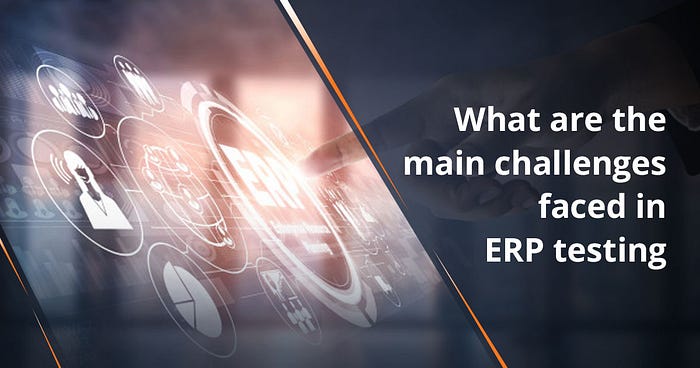Enterprise Resource Planning (ERP) has become the cornerstone of achieving success in the competitive world of business today. An ERP software suite helps an organization to conduct its operations seamlessly by integrating the departments, branches, processes, and activities. The ERP software suite comprises multiple applications with the capability to collect, store, organize, and analyze data emanating from multiple processes and functions. It can be easily deployed on-premises or on-cloud depending on the business objectives. It can help organizations in optimizing costs, enhancing efficiency, better monitoring of resources, quicken decision making, and improving competitiveness.
However, not everything is hunky-dory with implementing an ERP software suite and may involve a few daunting challenges. The challenges can be attributed to poor management of the suite including inadequate training of the people using it. The people should have the expertise in conducting ERP testing to ascertain if the software suite is capable of meeting all business requirements. Further, testing ERP systems can bring out (and fix) the glitches or issues within the systems before they are deployed. Let us understand the main challenges testers face during ERP implementation.
Challenges for ERP application testing services
ERP
can transform the manual operations of enterprises into digital and
bring about transparency, speed, flexibility, accuracy, and convenience.
However, any ERP software testing exercise can face a raft of
challenges as:
Choosing the best ERP software suite: The
market has many ERP systems with each claiming to be the best. This
makes it difficult to choose one that suits your business requirements.
So, at the outset of choosing an ERP software suite, find out the
business requirements and how the ERP software could help addressing
them. Further, the ERP software suite and its various applications
should align with your business domain. Analyze the features of the
suitable ERP software for your business and choose one with attributes
like robustness, customizable, secure, and easy-to-operate.
Technical challenges: For proper ERP implementation, the entire system comprising software applications, databases, hardware, servers, network, and users should collaborate and work seamlessly. However, unless an enterprise is using a cloud-based ERP software suite, the hardware and servers may need to be changed. In addition, the speed and bandwidth of the internal network should be considered along with its interface with mobile devices. If these issues are ignored then there could be issues like latency or even system malfunction. Enterprises can weigh between implementing ‘as a service’ cloud-based or on-premises ERP systems for both can have their pros and cons.
Quality of data: The ERP implementation solutions can have compatibility issues with the data generated through legacy resource planning systems working within organizations. Thus, proper project planning should precede the implementation of any ERP centre of excellence. The planning would highlight the modifications the ERP system would need for its smooth functioning.
Adequate managerial support: An ERP software can trigger comprehensive changes in an enterprise’s traditional business model, practices, and operations. Also, the information keyed-in by one user in a process within the ERP suite may trigger an instant response in other processes in real-time thereby disrupting the entire ecosystem. And unless a change in the working culture of the organization is initiated from the top, the real benefits of implementing an ERP system may remain a distant dream.
Adequate training: The success of an ERP system would depend on the people using it. So, the employees should be adequately trained and motivated in operating the system. The ‘resistance to change’ among employees can be addressed by explaining the benefits of the system clearly. The managers may initiate ‘one-to-one’ communication in explaining how the system will make things easier and convenient for them. This will help employees to accept ERP validation for various operational aspects.
Inventory management: Zeroing on the perfect quantum of inventory can be tricky, for it could either be too less or too much for the organization’s requirements. So, it is important to consider the lead time wherein proper procurement of the inventory can be done in real-time instead of waiting until the inventory is exhausted in the warehouse. The ERP system can monitor the levels of inventory and let the management know once a shortage is noticed. For example, any shortfall in inventory should alter the status of sales by making it unavailable for any new requests.
Conclusion
Pulling off any ERP implementation and addressing the various challenges would entail detailed planning and monitoring. A proven approach to ERP testing including the conduct of due diligence is critical to streamline processes and achieve proper business outcomes.
Article Original Source:
https://medium.com/@hemanthkumar989/what-are-the-main-challenges-faced-in-erp-testing-72e28ffc947a

No comments:
Post a Comment